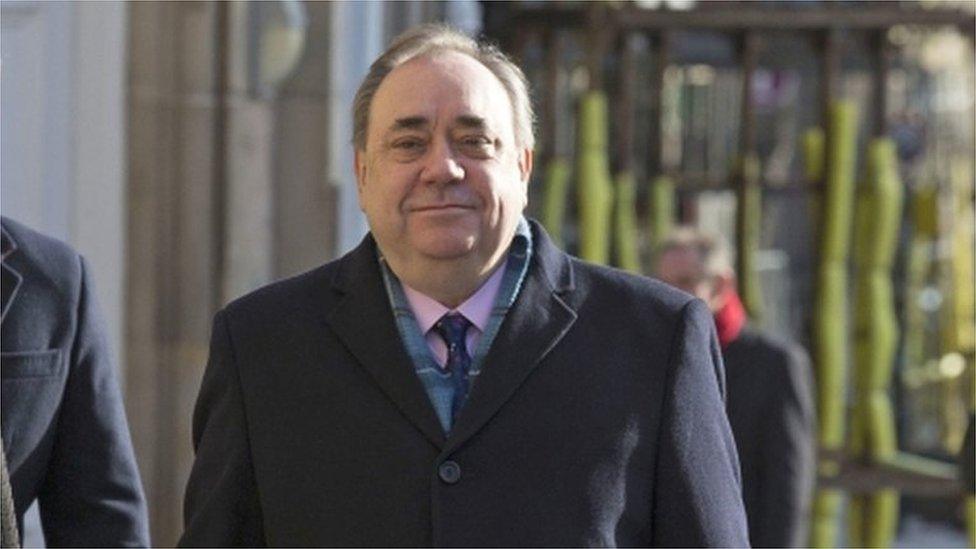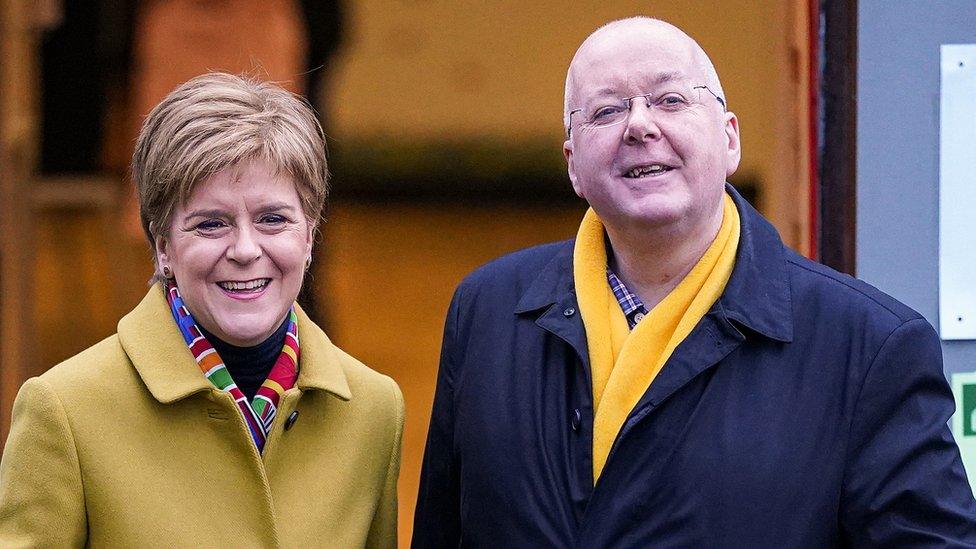Nicola Sturgeon denies obstructing Alex Salmond inquiry
- Published
Nicola Sturgeon says ‘Salmond inquiry ‘can call me any time it likes’
Nicola Sturgeon has insisted her government is not "obstructing" Holyrood's Alex Salmond inquiry and has offered to face MSPs "any time".
The committee studying the government's botched investigation of Mr Salmond has said it "cannot proceed" at present.
Members have complained about the amount of information being provided by the government, the SNP and Mr Salmond.
The first minister said the idea her government was trying to block the probe "bears no scrutiny whatsoever".
Amid angry exchanges at Holyrood, Ms Sturgeon said it was "outrageous" that she was being accused of not answering questions.
A special committee has been set up at Holyrood to examine the collapse of a government investigation into two harassment complaints against Mr Salmond.
The former first minister successfully took the government to court over the internal probe, which was ruled unlawful due to procedural flaws and won him a payout of more than £500,000.
MSPs have collected written evidence from the government and Mr Salmond and have held sessions with several witnesses, including Permanent Secretary Leslie Evans and Lord Advocate James Wolffe.
But convener Linda Fabiani said the cross-party group was "completely frustrated with the lack of evidence and, quite frankly, obstruction it is experiencing".
The Scottish Conservatives have pointed to comments Ms Sturgeon made in January 2019, when she told the chamber that she would "provide whatever material" was asked for by the committee.
The government has refused to hand over some papers containing privileged legal advice, arguing that it "would not be in the interests of good government and the upholding of the rule of law".

Mr Salmond won a £500,000 expenses payout from the government over its botched investigation
Tory MSP Oliver Mundell was ejected from the Holyrood chamber on Wednesday after refusing to withdraw a claim that Ms Sturgeon had "lied to parliament".
Conservative group leader Ruth Davidson pressed the point again at first minister's questions, asking what had made Ms Sturgeon "break her word".
Ms Sturgeon replied that she took the inquiry "very seriously", saying the Tory accusations were "not an accurate characterisation of the position".
She said she had submitted a written statement of her own and had still not been invited to give oral evidence.
"As I understand it the only material that hasn't been provided is material where there are legal reasons why it cannot be provided, including the issue of legal privilege," she said.
Ms Sturgeon said more than 1,000 pages of material had been made available and officials had given more than 10 hours of oral evidence. The government also intends to initiate legal proceedings to potentially make more material available.

Ms Sturgeon said it was "not reasonable" to expect her to answer questions about whether her husband had sent text messages or not
The committee has also written to the Court of Session asking for documents from Mr Salmond's judicial review case to be disclosed.
Ms Davidson said it was "utterly unprecedented" for a parliamentary committee to have to go to court "to ask for access to documents because the government has refused to hand them over".
She said that as leader of the SNP and first minister, Ms Sturgeon could "ensure this evidence is provided with a snap of her fingers".
She also pressed the first minister over allegations about text messages said to have been written by Ms Sturgeon's husband, SNP chief executive Peter Murrell.
One SNP MP - former Holyrood Justice Secretary Kenny MacAskill - has said he was sent an anonymous letter, external "that purported to be messages from the SNP chief executive to another senior staffer" which "suggested pressure be brought to bear on police investigating Alex Salmond".
Ms Sturgeon said she understood there was a police investigation into "the obtaining of these messages and the passing of them to the committee".
She said the committee should call the people involved in the claims, saying it was "not reasonable" for her to have to answer for "things other people might or might not have done".
She said: "The committee can convene this afternoon and I will answer questions.
"It is outrageous that I am in a position of having given written evidence two months ago, it has not been published and I have not been invited to give evidence, and I am somehow being accused of not answering questions - and in parliament being expected to answer for other people."